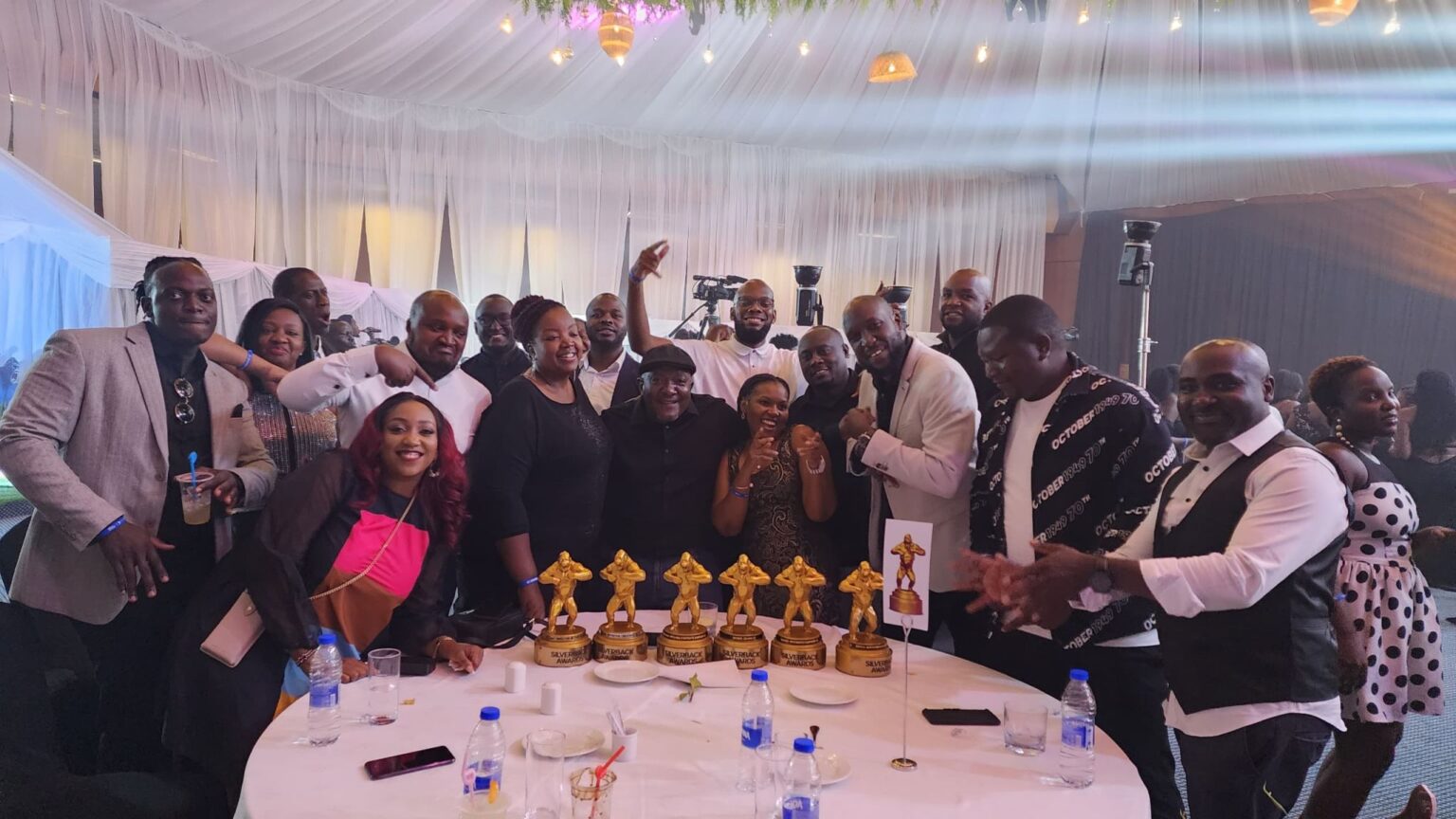By TJ Jordan
Last November, a beaming group of staff from MetropolitanRepublic collected their gorilla-shaped trophy at the Silverback Awards, Uganda’s top advertising and public relations gala.
The South African PR agency had won its prize for promoting the “sustainable development” of Uganda’s untapped oil reserves by French oil company TotalEnergies.
MetropolitanRepublic — which is part-owned by British communications giant WPP — described the brief for the award-winning “Action for Sustainability” campaign in its entry to the Silverback Awards: to devise an approach that “squashed all the negative PR” from protests against TotalEnergies’ plans for a 1,443-kilometre pipeline to export oil from Uganda’s Lake Albert via neighbouring Tanzania.
An accompanying video featured photographs of Ugandan anti-pipeline campaigners to illustrate this “backlash” and described them as “haters”.
“How do you launch a successful project off the back of this?” asks the narrator in the video. “Well, you develop a 360 PR campaign that retells your story the way it should be told.”
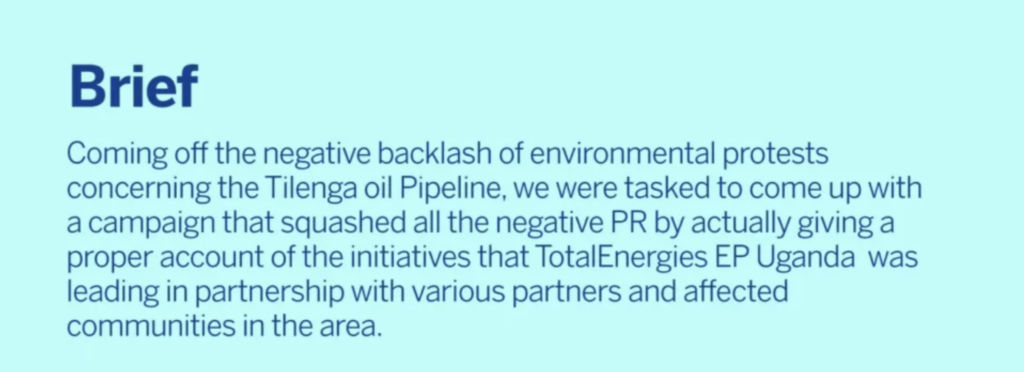
A screenshot from the award submission published on the Silverback Awards’ website. The Tilenga pipeline is a feeder pipeline under construction to carry oil from the Tilenga oilfields to the start of EACOP. (Credit: Silverback Awards)
Now, DeSmog can reveal that Ugandan police or military personnel have arrested, beaten, threatened, or harassed at least eight of the 15 campaigners pictured in MetropolitanRepublic’s award submission video.
These incidents — documented via video taken at protests, interviews with the campaigners, and police records — took place both before and after the video was published on the Silverback website in March.
Subscribe to our newsletter
Stay up to date with DeSmog news and alerts
There is no indication that MetropolitanRepublic’s campaign or the award submission led directly to any specific incidents affecting the activists. Nevertheless, DeSmog found that the agency engaged a network of social media influencers to post hundreds of times in support of TotalEnergies’ plans to mitigate the impact of the pipeline — even as protestors were being beaten and harassed.
“These PR firms are sponsoring our oppression,” said Hillary Innocent Taylor Seguya, one of the campaigners pictured in MetropolitanRepublic’s award submission video. “The more you push misinformation to the rest of the world, the more it means that you don’t care about our rights.”
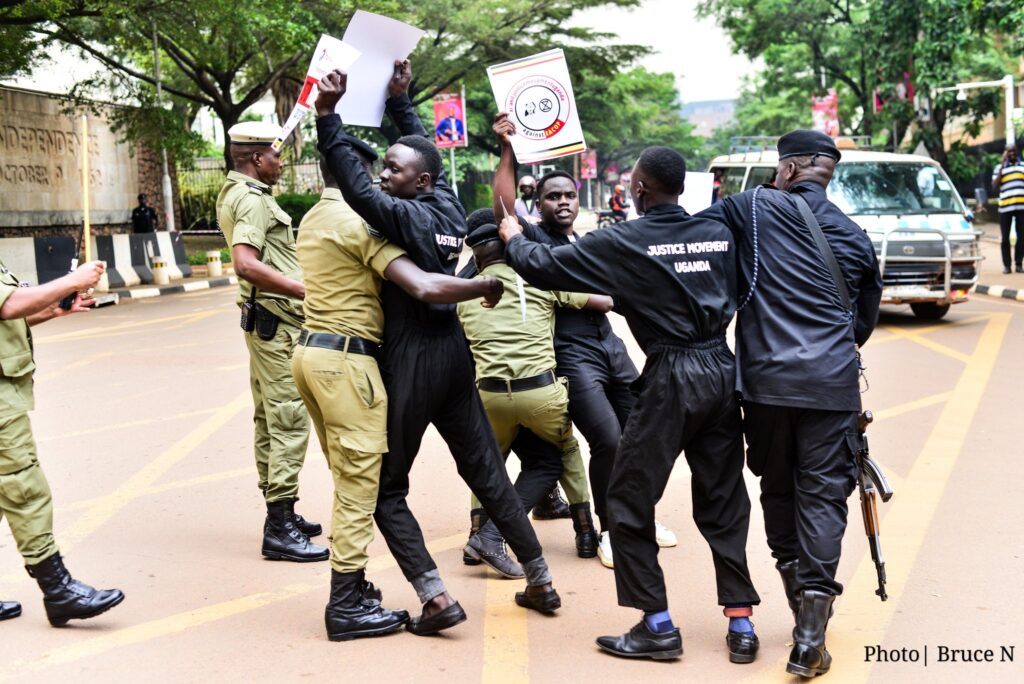
Since the pipeline project was first announced in 2017, advocacy groups have highlighted concerns over the displacement of communities in Uganda and Tanzania, damage to ecosystems and wildlife, and the climate impact of burning Uganda’s oil. The outcry has prompted some banks, insurers, and the PR company Edelman — which has represented oil companies for decades — to shun the project, known as the East Africa Crude Oil Pipeline, or EACOP.
In June this year, UN Secretary-General Antonio Guterres urged communications agencies to stop working for fossil fuel companies, saying PR campaigns run by “Mad Men fuelling the madness” were making the climate crisis harder to address.
MetropolitanRepublic, however, defended its role in promoting the pipeline — a joint venture between TotalEnergies and state oil companies from Uganda, Tanzania, and China.
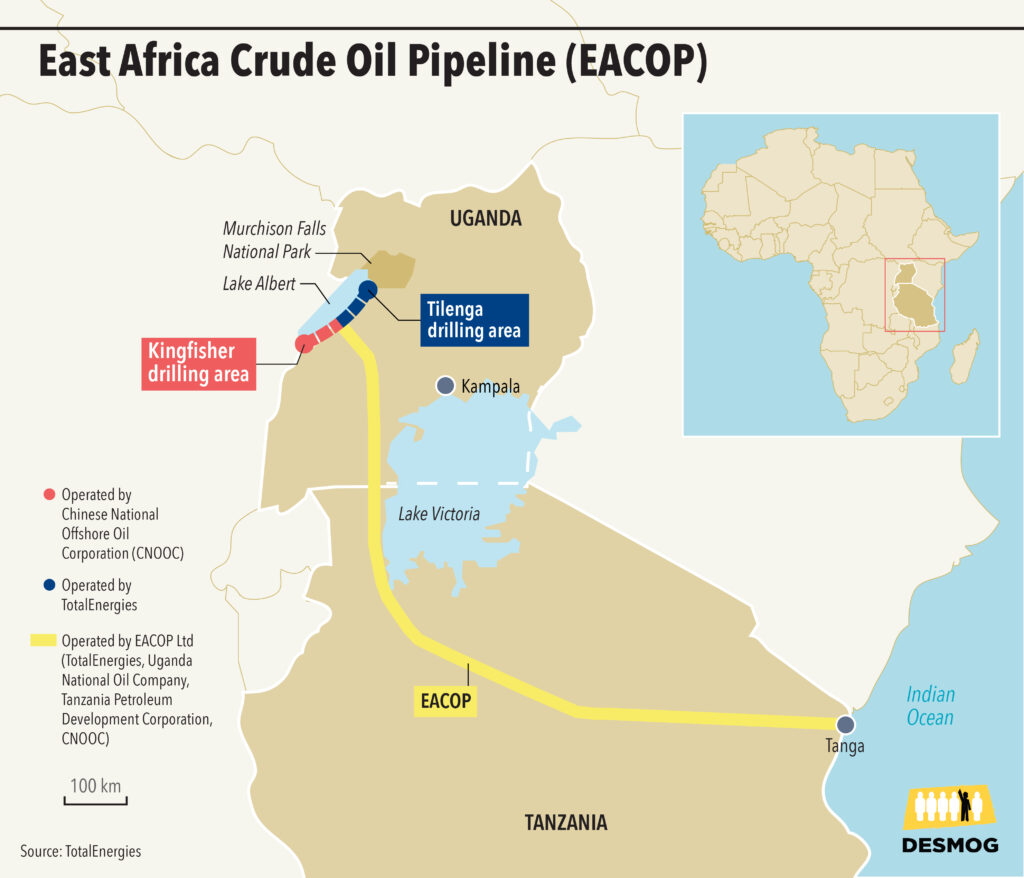
“As with any narrative, there are two sides to this story,” Peter Mwayi, MetropolitanRepublic’s PR manager, said in a statement. “In this case, while the concerns of environmental protestors are valid and important, we were tasked with ensuring that [TotalEnergies’] side of the story — which is the efforts toward sustainability, community engagement, and addressing public concerns — was equally well understood.”
TotalEnergies EP Uganda denied that it had briefed MetropolitanRepublic to design a campaign that tackled the protests, saying it had asked the agency to raise awareness of its “sustainable development of Uganda’s oil and gas resources”.
WPP, whose global network of ad, PR, and marketing agencies includes 165 subsidiaries in Africa and a 36 percent stake in MetropolitanRepublic, did not respond to a request for comment. The London-based company’s link to the planned pipeline has not previously been reported.
One WPP employee — who works at a different agency in its network and did not want to be named for fear of professional repercussions — said seeing MetropolitanRepublic’s award submission made them feel “ashamed” to work for the same parent company.
“To continue putting profits before the lives and welfare of billions of people on this planet, and to do so in such a fake way, is disgusting,” the employee said.
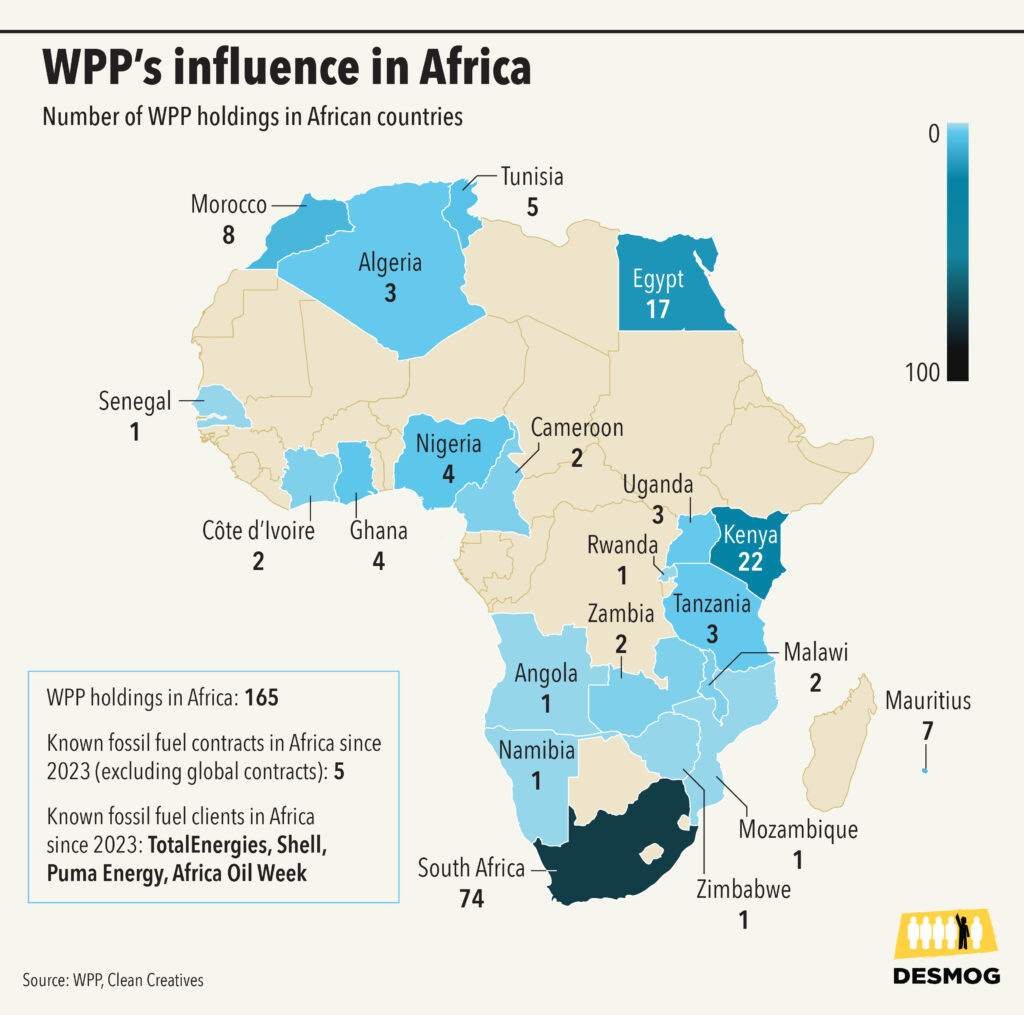
‘Fighting for Our Future’
Less than three weeks after MetropolitanRepublic picked up its Silverback award in November 2023, two of the activists pictured in its video — Bwete Abdul Aziiz and Shafik Kalyango — were arrested while taking part in an anti-EACOP demonstration in Kampala. Police kicked, punched, and forcefully interrogated them and two others in a room at the entrance to parliament, according to the protestors. Aziiz said Kalyango was knocked unconscious for more than five minutes.
“They were trying to get information from us,” Kalyango, a 25-year-old student from Kampala, told DeSmog. “[They said] ‘Who are you working for?’ We [said], ‘No, we are fighting for our future.’”
Kalyango, Aziiz, and nine other campaigners then spent a month in Uganda’s notorious Luzira Maximum Security Prison before being released on bail. The campaigners say they have been told they could face up to a year behind bars.
In total, six of the campaigners that feature in MetropolitanRepublic’s video have been arrested and experienced police violence or threats, DeSmog found.
Benjamin Akiso, 24, was one of nine activists detained at a peaceful demonstration against EACOP on 4 October 2022. The following day, TotalEnergies unveiled a huge “Action for Sustainability” mural in the centre of Kampala. Depicting a cross-section of Ugandan society, its caption read: “Working together to develop Uganda’s energy resources sustainably.”
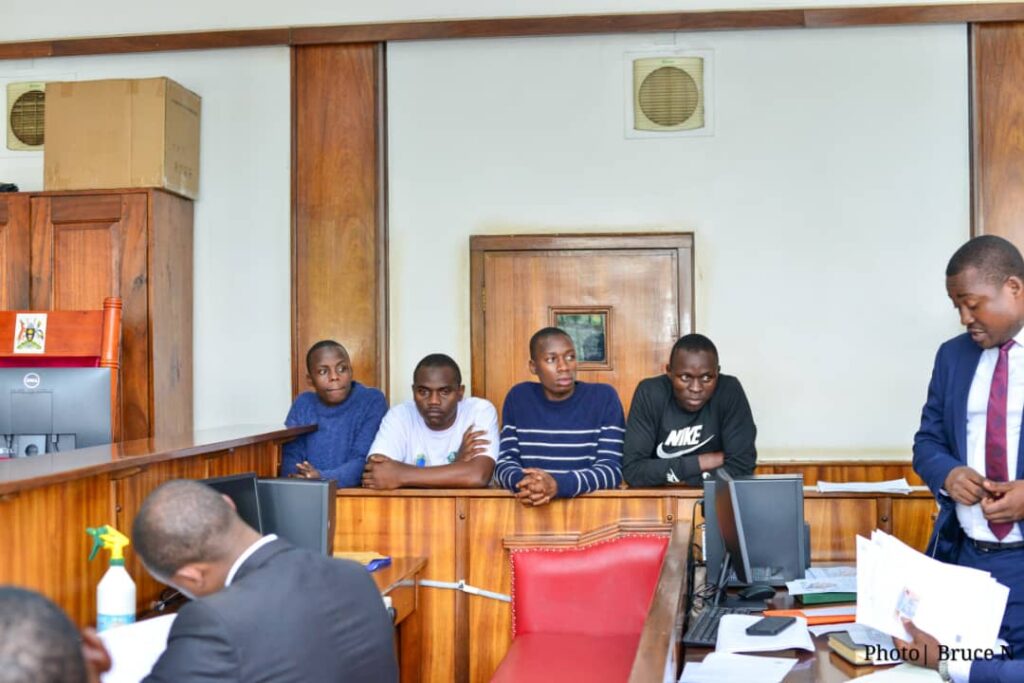
Akiso was most recently arrested while protesting against the pipeline on 23 July this year. Videos taken by onlookers and shared with DeSmog showed at least three Ugandan soldiers hitting Akiso with batons and dragging him to a police car.
Five of the activists pictured in MetropolitanRepublic’s video said they have received threats and harassment via social media, texts, or phone calls. Often, it is not clear who sent the messages.
“I will send my agents school by school to make sure that if they catch you, they abduct you or take you far away i [sic] think that’s how you will know we are serious,” read one WhatsApp message received by Mpiima Ibrahim, 22.
DeSmog has seen numerous social media posts threatening Hillary Innocent Taylor Seguya — the first activist to be pictured in the video — due to his opposition to the pipeline.
“If you bring out activists who have been brutally beaten, arrested, or threatened, and you use them to push your narrative that EACOP is a sustainable project, I think [you are] doing a disservice to the people of Uganda and Tanzania,” said Seguya, referring to the depiction of campaigners in MetropolitanRepublic’s award submission.
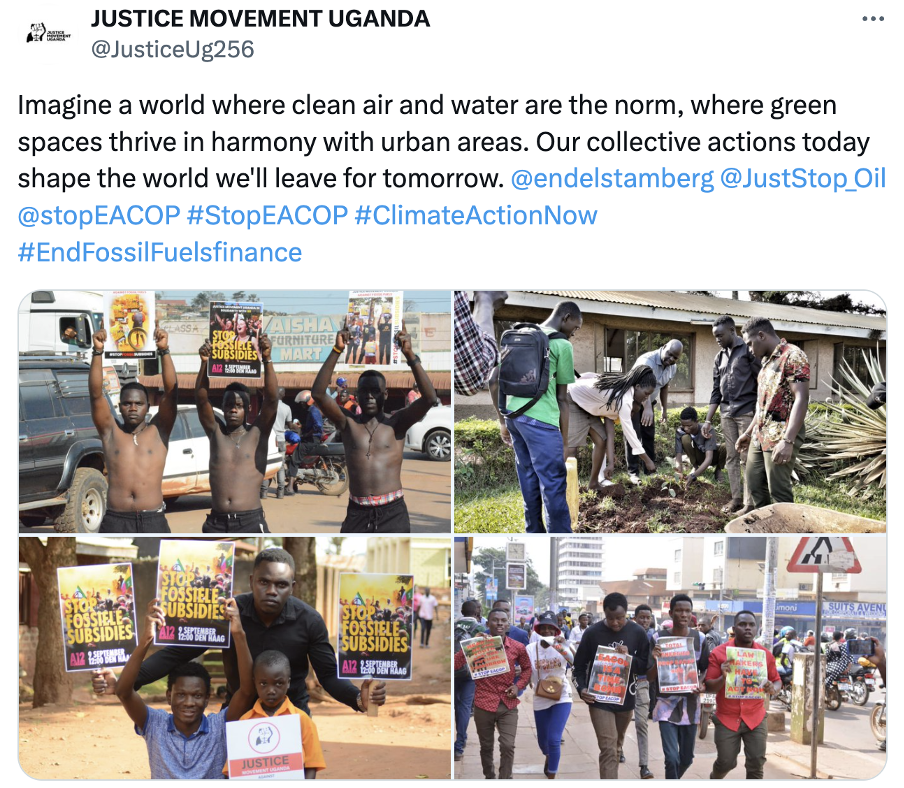
The BBC, citing information from Meta, the company that owns Facebook, reported in January that some of Seguya’s online harassment came from fake social media accounts suspected to be run by Ugandan government agency the Government Citizen Interaction Centre (GCIC). The GCIC denied this allegation.
DeSmog found the GCIC and two of its employees posted using the hashtag “#ActionForSustainability” a combined 78 times during MetropolitanRepublic’s campaign.
One post by GCIC employee Michael Woira was directed at Seguya, saying that “hard terms” being used by TotalEnergies were “confusing” the campaigner. Woira is shown wearing a TotalEnergies hat in his X profile image.
“The campaign drew interest not just from the Government of Uganda but from the Ugandan people across the different walks of life,” said a spokesperson from TotalEnergies EP Uganda.
“[This can be] seen from the level of engagement with the campaign…(sharing, liking, asking for more information, asking to visit the site operations so that they can also witness first hand).”
The Ugandan government, the GCIC, the Uganda Police Force, and the Uganda Peoples’ Defence Forces did not respond to requests for comment.
As MetropolitanRepublic’s award submission video ends, the narrator signs off: “We continued to deliver on our promise and showed the haters that actions do speak louder than words.”
Hanna Hindstrom of advocacy group Global Witness said there was “a very real chance that TotalEnergies’ PR efforts [had] bolstered the Ugandan state’s vicious crackdown on civil society and put peaceful climate campaigners at risk.”
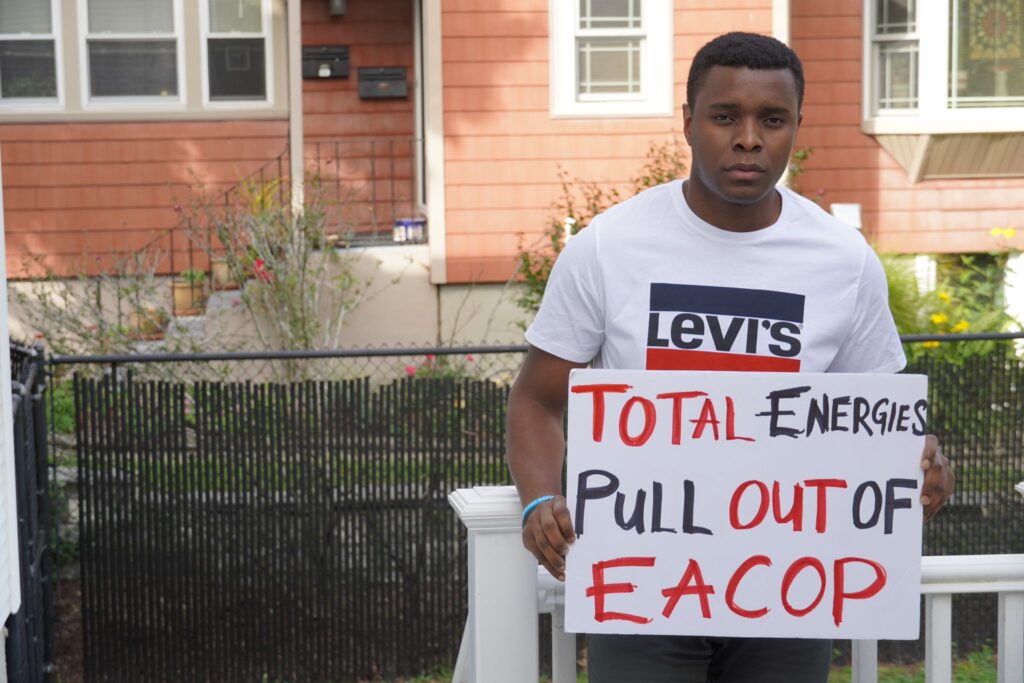
“These are not ‘haters’ doing ‘PR’,” added Hindstrom, who co-wrote a December 2023 report that argued TotalEnergies should bear some responsibility for the Ugandan government’s intimidation of activists and local organisations. “They are inspiring, mostly young people who are putting their lives on the line for a liveable future.”
MetropolitanRepublic’s Mwayi said: “We understand concerns regarding the use of protest images and the potential perception that the campaign downplayed the voices of protestors. However, it’s crucial to emphasize that the campaign’s goal was not to undermine their concerns, but rather to present the full picture.”
TotalEnergies EP Uganda said that the company has engaged with civil society and the Ugandan government on issues of human rights surrounding the pipeline and “does not tolerate any threats, intimidation, harassment, or violence against those exercising their Human Right to freedom of expression to protest peacefully against our business or activities.”
Astroturfing: Paid for or grassroots support?
MetropolitanRepublic’s strategy to counter what it described as the “backlash” against the pipeline began on social media on 27 September 2022.
The agency sent instructions for posting the hashtag #ActionForSustainability to a team of social media influencers via a WhatsApp group, according to an influencer who posted in support of the campaign and who declined to be named for fear of being blacklisted by clients.
Over the next three days, 21 influencers posted the #ActionForSustainability hashtag, mostly alongside pictures of 11 women on the streets of Kampala with “Actions Speak Louder” emblazoned across matching T-shirts and placards.
The influencer said they were paid 100,000 Ugandan shillings (roughly £20 or $27) to post the images. One other influencer also confirmed being paid. None of the other 19 accounts contacted by DeSmog — or any of the other accounts involved later in the campaign — responded to questions about their involvement.
Although companies in Uganda sometimes advertise products by paying people to hold branded placards, there was no visible indication of any connection to TotalEnergies or the pipeline.
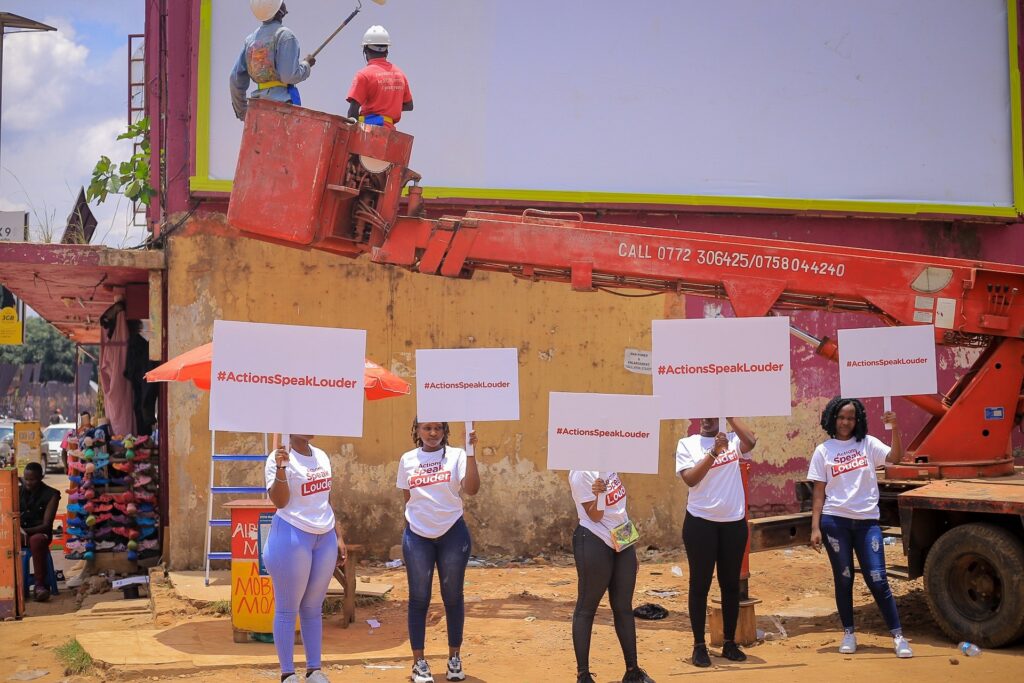
During this period, #ActionForSustainability became one of the highest trending hashtags among X users in Kampala, according to MetropolitanRepublic’s award submission.
When the campaign officially launched on the evening of 29 September, anyone now following the popular hashtag had been primed for a new wave of content: The influencers — as well as accounts run by TotalEnergies, government-backed media outlets, and government departments — began using the hashtag #ActionForSustainability to post positive content about the pipeline and TotalEnergies’ contributions to the local community.
Between 27 September 2022 and 15 January 2023, 26 accounts that either described themselves as influencers or appeared to be influencer accounts posted more than 400 times to a combined 1.6 million followers.
Many had feeds congested with promotions of other unrelated campaigns or products, from perfumes to insurers. Most had never posted about sustainability or EACOP before.
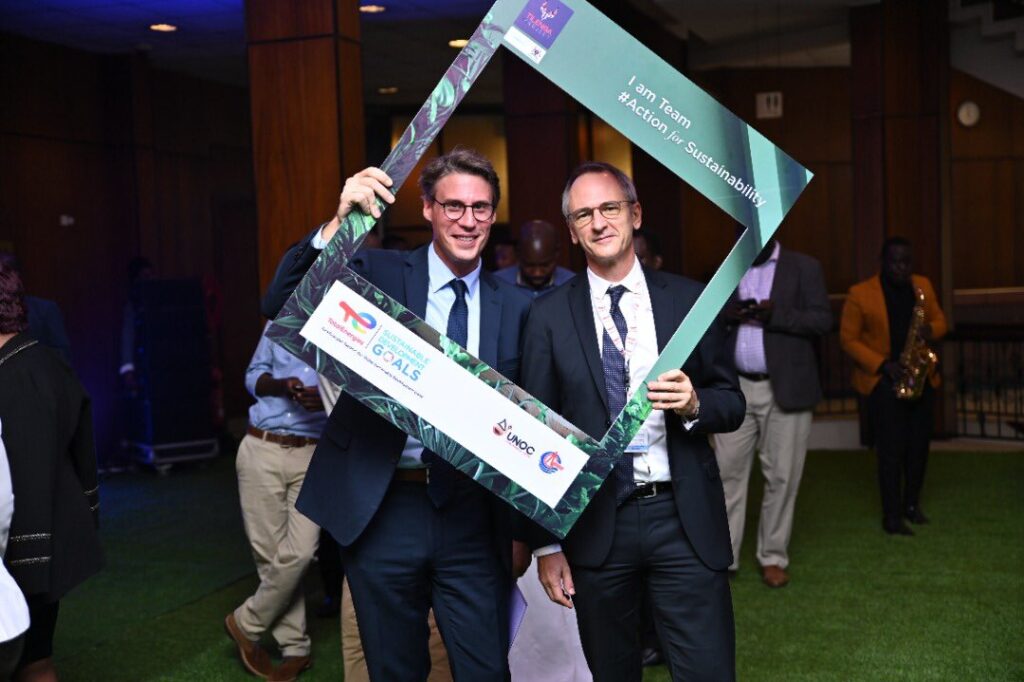
Due to competition regulations from regional economic bloc COMESA, influencers in Uganda are required by law to ensure that social media users can tell the difference between authentic and paid-for content — for example, by adding “#ad” to their posts. None of the accounts did so.
“If you work in digital marketing you will be able to pick up that this [coordinated support] is a little suspect,” said Phumla Duma, a digital campaigner who works on the Kick Total Out of Africa campaign, which opposes the pipeline. “But to the average user, that isn’t necessarily the case.”
Mwayi, of MetropolitanRepublic, said the agency’s engagement of influencers “followed standard industry practices” and its approach was “transparent.”
Mark Read, the CEO of MetropolitanRepublic’s parent company, WPP, said in the company’s 2023 Sustainability Report that its “agencies are required to follow rigorous standards of honesty and integrity.”
But a former campaign strategist from another agency in WPP’s network who reviewed DeSmog’s findings said that the tactics used by MetropolitanRepublic were a form of “astroturfing” — a term used to describe when a corporate or political message is presented as though it is being driven by grassroots campaigners.
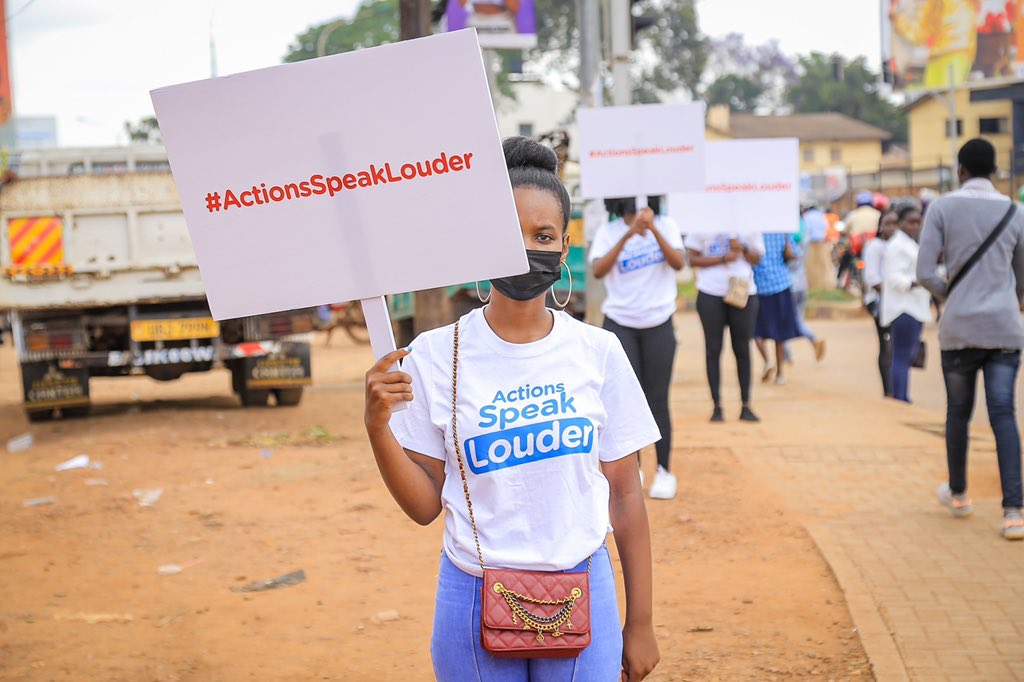
“The people in the photos are holding placards, there are no TotalEnergies logos — it’s obvious that this is meant to have the feel of something organic,” said the former WPP strategist, who declined to be named for fear of legal repercussions from their ex-employer.
“Even the name of the whole campaign, #ActionForSustainability, co-opts the language of campaigners.”
‘Sustainable Oil & Gas’
On 29 September, TotalEnergies announced on X it was launching “Action for Sustainability” to “showcase initiatives we are undertaking to ensure sustainable [development] of Uganda’s oil & gas resources”.
Critics have, however, raised questions about whether some of these initiatives — which include plans to restore natural habitats, provide new and improved housing to those displaced by the pipeline, and improve access to clean water — could do enough to make the pipeline “sustainable”.
One initiative TotalEnergies promoted during the campaign is a plan to plant 100,000 trees in Tilenga, one of the two drilling areas in northwestern Uganda that will produce the oil carried by EACOP.
According to the European Environment Agency, a tree can absorb an average of 22 kilos of carbon dioxide (CO2) each year. U.S.-based research group the Climate Accountability Institute found that EACOP, through its construction, operation, and the burning of the oil it will carry, will generate 379 million tonnes of CO2 during its planned 25-year lifetime — nearly 7,000 times more than the trees could absorb in the same period.
Johnny White, a lawyer from environmental law firm ClientEarth, said if the “Action for Sustainability” ads promoting initiatives like this had been launched in the UK — where WPP is headquartered — the campaign would have risked violating rules on misleading advertising.
“The world will not keep the rise in global temperatures to safe limits if fossil fuel companies continue to exploit new oil and gas — the science is very clear on this point,” said White. “Describing highly polluting fossil fuels as ‘sustainable’ in advertising is very likely to mislead people.”
TotalEnergies EP Uganda said its oil activities in Uganda and Tanzania would support local development in the region. The company also said that new oil and gas projects were still needed to meet global energy demand, and that it is a major player in providing and developing renewable energy.
‘Green Claims’
According to a document available on TotalEnergies’ website, the company created graphics with 16 different statements about its “Action for Sustainability” initiatives. Most of these were shared on social media, made into posters, or shown at events.
The ex-WPP strategist, who is familiar with the company’s internal greenwashing standards, told DeSmog that every statement appeared to breach at least one of WPP’s 12 “green claims principles”.
The internal guidelines aim to ensure that WPP’s agencies correctly advise clients on how to legally and ethically talk about their sustainability credentials. Its principles — such as “substantiate the claims” and “do not omit or hide important information” — are based on standards published by regulators including the UK Competition and Markets Authority, according to WPP.
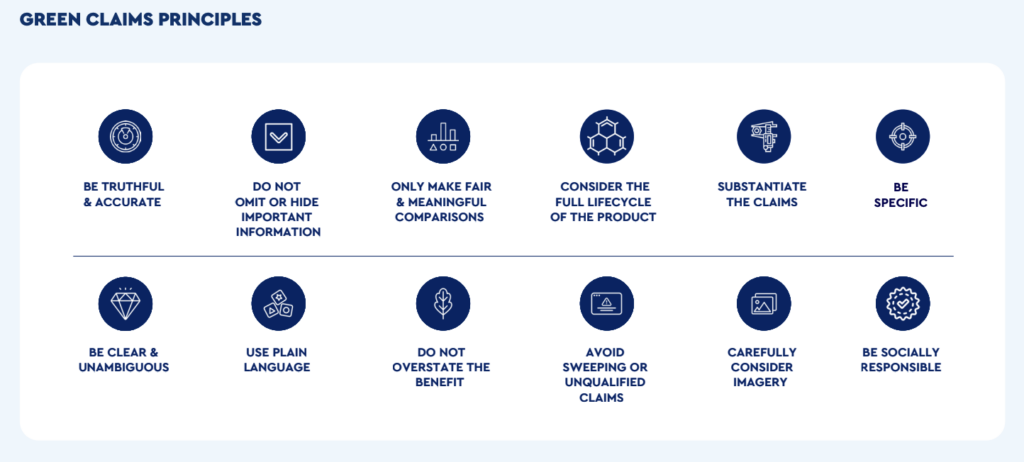
“I don’t see how this messaging could have met WPP’s guidance if the process was being taken seriously,” said the former WPP strategist.
One graphic used in the campaign stated that the Tilenga drilling project “has been designed to have one of the lowest [greenhouse gas] emissions at 10 kgCO2/boe [per barrel produced] with plans for further reduction by using renewable energies.”
“Lowest compared to what?” said the ex-WPP strategist. “If whoever made these graphics was abiding by WPP’s guide, they would know they should only be making ‘fair and meaningful comparisons’”.
The average person, they added, would be unlikely to understand that the statement only refers to the carbon footprint of operating the pipeline — not the eventual burning of the oil carried by the pipeline.
“Our job as an agency was to communicate these [initiatives] in a clear way, as part of a broader campaign to correct the negative narrative and highlight [TotalEnergies’] responsible actions,” MetropolitanRepublic’s Mwayi said. “We do not independently verify environmental data or investigate the operations of our clients”.
‘There to Support Them’
PR and ad agencies have yet to experience equivalent scrutiny to banks and insurers over their role in EACOP. But there is a growing focus on the industry’s wider role in supporting the fossil fuel industry. More than 1,000 agencies have now taken a pledge to avoid fossil fuel clients led by industry campaign group Clean Creatives.
The “Big Six” communications groups — WPP, Omnicom, IPG, Publicis, Dentsu, and Havas — that dominate the world’s advertising and PR market via their hundreds of subsidiaries, are yet to follow suit, however. Together, these agencies hold 278 known fossil fuel contracts, according to Clean Creatives’ F-List report, which was published on 24 September.
WPP — the largest communications company in the world by revenue — has pledged to become net zero by 2030, meaning it will seek to reduce and offset all of its CO2 emissions.
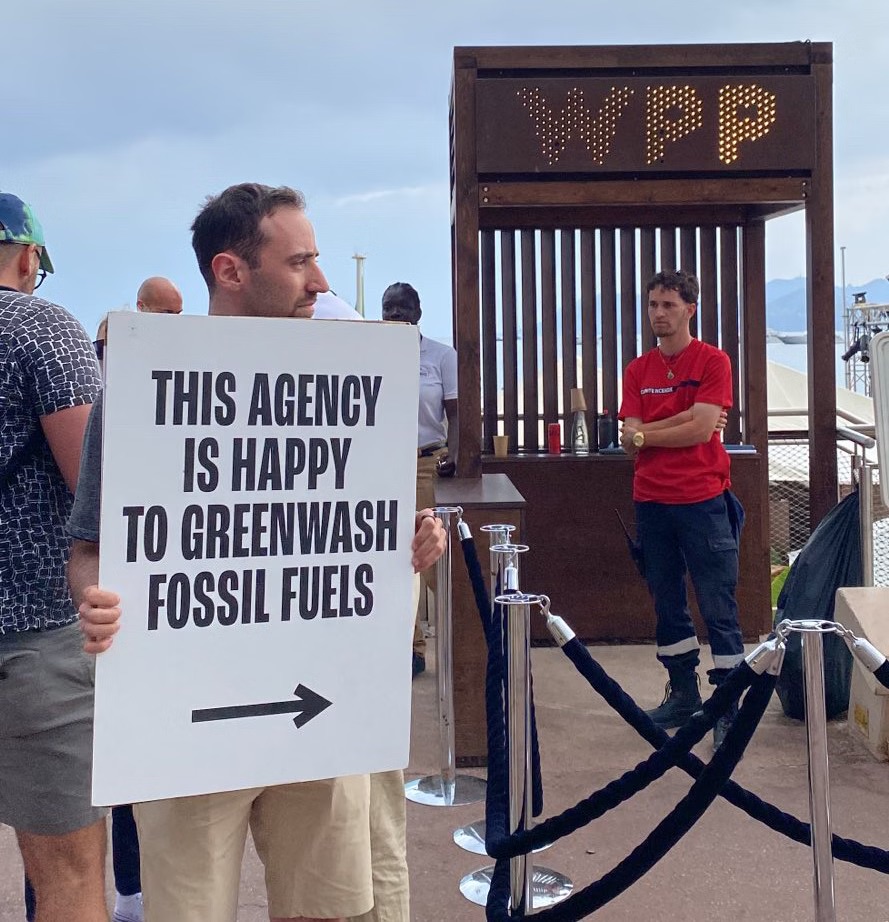
But according to Clean Creatives’ report, WPP’s agencies have collectively held at least 79 known fossil fuel contracts since the start of 2023 — more than any other PR and advertising company. At least five are focused solely on reputational work in Africa, including with TotalEnergies, Shell, Swiss oil refiner and supplier Puma Energy, and the industry conference Africa Oil Week.
In 2022, a PR agency in WPP’s network called BCW helped launch TotalEnergies’ media campaign “Truly Ugandan”, which it said on Facebook promoted “the opportunities that exist for Ugandans” through the country’s new oil and gas industry.
WPP’s work on EACOP via MetropolitanRepublic and BCW cuts a contrast with the position taken by Edelman. The U.S.-based agency is famed for its work protecting the fossil fuel industry, but reportedly ended a relationship with Standard Bank in 2022 because the South African bank was considering funding the $5 billion pipeline (it finally announced it would do so in June this year).
In line with many other senior advertising industry executives, Read, the WPP CEO, has said his company can play a role in helping oil and gas clients reach their climate goals — an argument met with scepticism by some industry insiders and climate campaigners.
“We are there to support them [oil and gas clients] on [the energy] transition,” Read told financial analysts in 2022.
Meanwhile, the intimidation of activists opposing the pipeline by the Ugandan authorities continues.
Martha Amviko, who features in MetropolitanRepublic’s award submission video, was arrested for the second time at an anti-EACOP demonstration in Kampala last month. Amviko told DeSmog that whilst being held at a police station, police threatened to torture and shoot her if she protested again.

Martha Amviko is arrested at an anti-EACOP demonstration on 26 August (Credit: Bruce Nahabwe)
According to Amivko, she spent nearly two weeks in Luzira Maximum Security Prison in a cell with one wash basin for over 100 people, before being released on bail on 6 September.
“We shall continue regardless of the PR companies,” said the 25-year-old teacher. “We shall continue to educate people and let them know that we have to fight against climate change. We are not giving up. We are not surrendering now until it’s done.”
Subscribe to our newsletter
Stay up to date with DeSmog news and alerts


